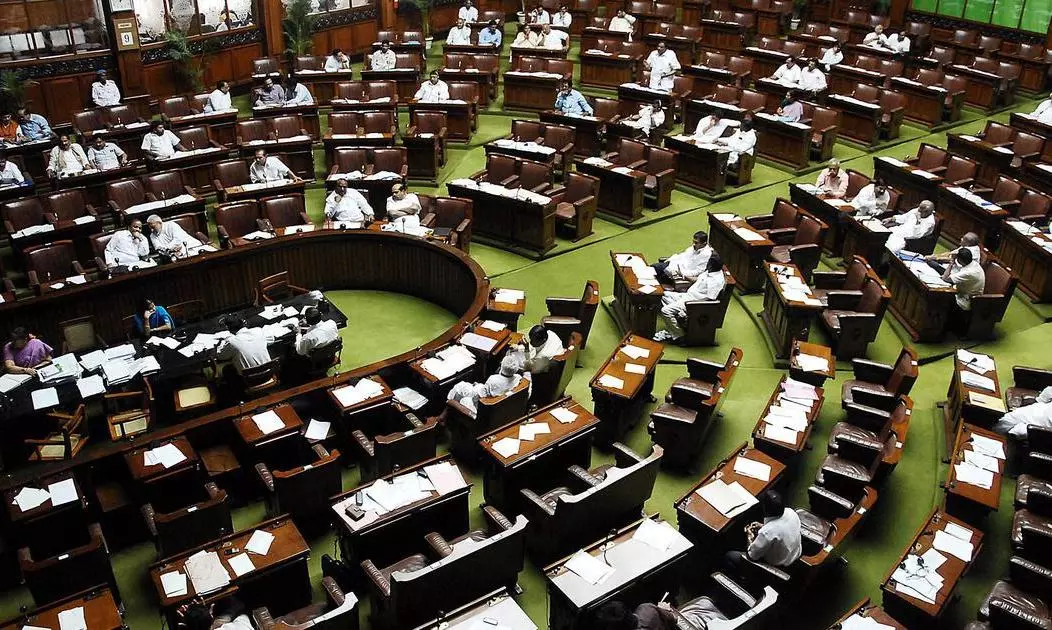
Using the pandemic as a cover
text_fieldsRepresentational.
"One day, world will call India the mother of democracy", said prime minister Narendra Modi while laying the foundation stone for the new parliament building. Another piece of news the country heard the same week was that the winter session of the parliament was cancelled. There was no better occasion for a sharper focus on the question whether democracy consists in building a parliament complex or people's representatives sitting to debate issues.
If it was the prime minister who went so eloquent about the new structure, the decision about not convening the winter session was communicated through a letter by the parliamentary affairs minister Pralhad Joshi to Congress parliamentary leader in Lok Sabha Adhir Ranjan Chowdhury, and that too in a reply to the Chowdhury's letter asking for a special winter session of parliament to be convened to discuss the farmers' agitation. The pandemic was the reason the minister cited for dropping the winter session and deciding that the next parliamentary session would be budget session in January.
The minister also claimed that consultations were held with political parties and that most leaders had suggested not holding the winter session in view of Covid-19. However, most of the leaders contradicted this claim. Opposition leader in the R ajya Sabha Ghulam Nabi Azad, Congress Chief whip Jairam Ramesh, spokespersons of NCP and Shiv Sena and several other leaders affirmed that they had not been consulted at all. The conclusion to be drawn is that the decision was more or less unilateral. With several issues on which the central government would like to evade a discussion, getting more vexing than Covid, the government has obviously used the pandemic as a cover.
This opportunism is all too clear from the fact that the government does not see Covid as an obstacle for many other actions. The moment the Maharashtra government thought of truncating the winter session of the assembly, leaders including BJP's Fadnavis were up in opposition. The budget session of parliament had been held at the beginning of Covid. And the monsoon session was held in the peak of the pandemic, though both were cut short by eight days each. The government would have definitely felt the convenience of this curtailment.
During the monsoon session, 25 bills were passed; of these 15 were in Rajya Sabha, and seven out of them were pushed through in a matter of four hours. Most striking of them all was the case of the farm bills: the government turned down the legitimate Opposition demand for a vote and 'passed' the farm bills using the wide leeway thanks to the pandemic. When figures showed that the pandemic impact was reduced after 16 November, the minister's counter contention was that during the winter there was the risk of it aggravating.
But it is during the same weather of winter, that big rallies were organised in Bihar with the participation of many including the prime minister himself! In Varanasi, Modi had held a Diwali programme. In Bengaluru and Hyderabad, Covid posed no hurdle for the BJP's processions. Far south in Kerala, even the three-tier local bodies election went off well. Bihar had its assembly elections and several others had by-elections, all in spite of the pandemic. It is during this same winter that in Bengal, in the run-up to the assembly elections that lie months away, defections and luring of leaders happen under the leadership of none other than the union home minister.
Government offices, commercial complexes and public programmes are all functional under Covid protocol. In the US, presidential election and Congress sessions went on in full swing. So is the case with many other countries. And then if Covid obstruction comes in the way in India alone, and that too only in the matter of parliament having its session, is it because the country is the 'mother of democracy'? Currently, Covid is not a hurdle for each performing his duty. It is not logical that parliament alone should shirk its responsibility. If legislative meetings and elections go on as usual all over the country, that means the process of people electing their representatives cannot be postponed. In the same way, the elected members of parliament cannot absolve themselves of their commitment to the people. The factor behind the cancellation of parliament's winter sessions is not the interest of the people or the members, but solely that of the central government.
The Modi government is pursuing a policy of diminishing the powers of the parliament. And the government has already given rise to a spate of burning issues. The parliament is the forum where the problems of the farmers are to be discussed. The demand for a special session for democratic deliberation exclusively on the stalemate was a reasonable one. Further, the tottering economy, increasing unemployment, denial of civil rights and the damage to federalism are all subjects that crave for debate in people's assemblies. The Covid pandemic itself, which the government cites as the cause for deferring the session, is a serious one warranting a parliamentary debate. If instead, the government is focussed on corporate interests alone with anti-farmer laws and contracts for parliament house construction, the world will adjudge the 'mother of democracy' as infertile.

















